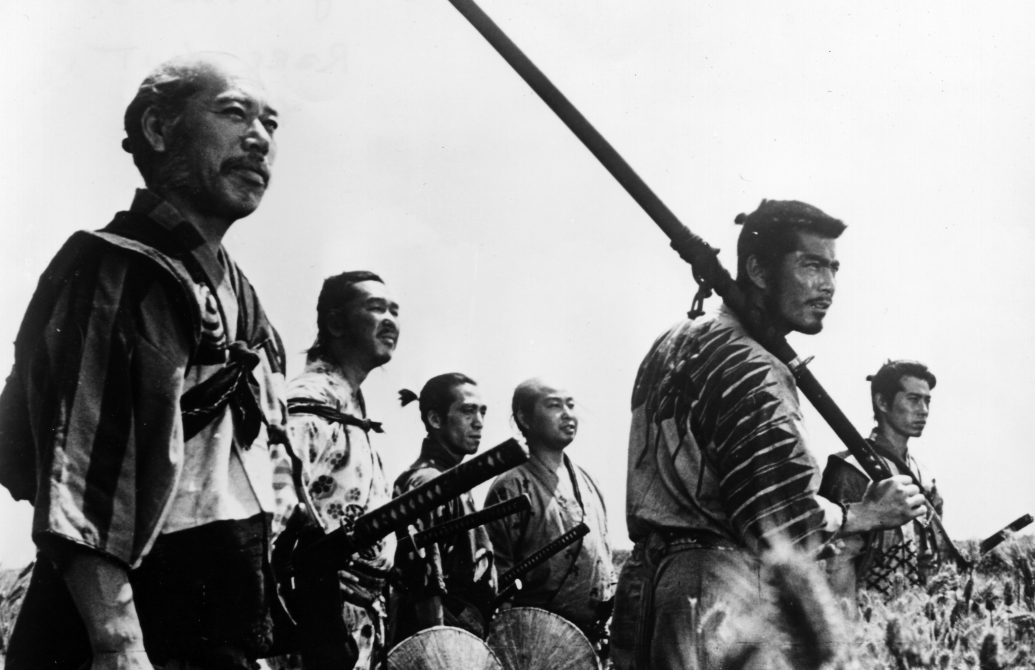This black-and-white film made me truly grasp the saying, “It’s not who you are, but what you do that matters.” Before watching, I used to think samurai were battlefield warriors, driven by a thirst for glory and unafraid to lay down their lives. But it turns out that no matter their title or status, it’s a person’s actions that define who they really are.
Seven Samurai is set in a poor, desperate village targeted by a band of bandits. The thieves plan to swoop in after the harvest and steal every last grain. The villagers argue over whether to submit or fight back. After some back-and-forth, the resistance faction wins out and seeks advice from the village elder. He suggests hiring hungry samurai to defend them.
Rikichi and his group of farmers set out to find these warriors. They face rejection after rejection, eating millet to save rice for the samurai’s payment, and endure mockery and scorn (the strict class system makes it absurd for peasants to dare hire samurai, who hold a far nobler rank).
Yet luck and sincerity smile on this humble band of farmers. They manage to convince their first samurai. Thanks to his reputation, a group of seven eventually forms to return and protect the village, taking on the bandits. How the story unfolds is something you should experience for yourself. Though it’s in black-and-white and runs over three hours, the script and performances are outstanding.
Next, I’ll share my thoughts on the farmers and the samurai.
What Do the Farmers Live For?
Life for these farmers is brutal. They toil endlessly, squeezed dry by bandits and officials alike. Yet they still find the will to carry on. It’s something I’ve puzzled over—today, with all our modern comforts, some people still lose the desire to live. So why do these poor, simple farmers, with their limited understanding, cling so fiercely to life?
Watching the film, I saw in them the resilience of nature itself. The sun, wind, soil, water, and plants have forged a vitality in them they might not even recognize. Beaten, robbed, humiliated—they still hold fast to their purpose. They lack the martial grace of warriors, but they pulse with the raw, earthy life-force of ordinary people.
Because their lives are so harsh, they cherish what little they have all the more. They love their grueling existence. Sure, they scheme a bit and act in their own interest when dealing with the samurai, but when called out, they don’t deny it or lash out with spite. It shows that, though uneducated, they’re willing to learn if someone guides them, opening their eyes to the fact that not everyone gambles their life or dignity over an empty stomach.
I admire the farmers’ survival instinct. Nature’s genius lies in endowing such tenacious spirits with the strength to sustain life.
What Do the Samurai Fight For?
But if everyone clung to life like the farmers, who would drive off the bandits? Who would dare confront society’s evils?
A noble class steps up, and I think part of their nobility comes from their fearlessness toward death. That’s the samurai. What unites them is their readiness to die, so long as it’s meaningful. In this group of seven, I noticed each finds a different meaning in death:
Kanbei Shimada is a seasoned samurai. From what’s said, he’s an unlucky one—fighting in seven battles, losing every time. Maybe luck isn’t on his side, but his skill is undeniable. To lose seven times and still stand tall, unshaken, calmly owning his limits—that’s real strength. A leader’s mental fortitude draws followers unconditionally. Take Shichiroji: the moment he reunites with his old commander Kanbei, he volunteers to follow him, even into death. Shichiroji sees duty as greater than death, while Kanbei values life enough to face death to secure it.
The young samurai Katsushiro lacks that depth of experience. He spots Kanbei’s talent and wants to learn from him. At first, Kanbei turns him away, thinking the kid doesn’t yet know what he wants or grasp the line between life and death. Plus, his eagerness for glory might waste his life pointlessly—you can’t grow if you’re dead, so Kanbei wants him to wait. But Katsushiro’s kindness and youthful zeal win him a spot in the seven.
Gorobei Katayama, with his constant grin, also stands out. I don’t know much about his past, but how he passes a test reveals his caliber. Dodging Katsushiro’s surprise attack shows skill, but anticipating it and sidestepping completely without a flicker of anger? That’s a whole other level.
Kyuzo is a true swordsman. Passionate about the blade, he roams in search of fights to hone his craft. Knowing a battle pitting six samurai and some farmers against over 40 well-armed bandits is lopsided, he joins anyway. He radiates integrity, self-reliance, and the courage of a master. What I love most isn’t his strength but his clarity in wielding it: sparring with a bamboo stick against another samurai, he warns that real swords could kill. The fool draws steel anyway and dies under Kyuzo’s blade. Life’s precious, but only to those wise enough to see it.
Kikuchiyo is the total opposite of his comrades. Not a samurai by birth, his mindset and behavior set him apart. At first, they mock and tease him, but slowly his buried virtues shine through. Kikuchiyo becomes the bridge between farmers and samurai: noble yet practical, mature yet childlike. His life must’ve been rough, giving him insight into the farmers’ pain and the samurai’s ruthlessness.
I didn’t get why Kikuchiyo hung around Kanbei at first. Later, I realized he longed to follow him like Katsushiro. But Kikuchiyo’s ashamed of his roots, and no one’s ever taught him how to express his wishes sincerely or temper his emotions. Torn by a childlike embarrassment, he tries to catch Kanbei’s eye by picking fights or clowning around. Living two lives, he carries the fullest experience to his end.
Though samurai Heihachi dies early in a fluke, his lesson hits deep: never underestimate anyone, and “blades don’t have eyes.” The sword that kills your foe can turn on you. In an angry farmer’s hands, it’s deadly. Untrained, they rely on raw strength and rage, not form or drills, making them hard to predict or control. It’s a warning to warriors not to dismiss amateurs—reading and subduing them isn’t always straightforward.
Seven samurai arrive at the village, but not all leave. War’s brutality spares no one. Their blood and bones feed the earth for next season’s crops. Only the boldest hearts step into that fray. These seven may not be the fiercest or most pedigreed warriors. They fall in an obscure village, marked by simple graves, their righteous deeds living on in the villagers’ tales—proof they’re true samurai, embodying the warrior’s spirit.
In Place of a Conclusion
I see farmers and samurai as a cycle of life and death. Those who dare to live alongside those who dare to die compose a tragic hymn to humanity. Digging into Seven Samurai, I read it inspired modern superhero films.
But I think it does more: it reminds us what a hero is. Heroes don’t need to save the world or wield superpowers. They simply choose to push back against inhumanity, valuing honor over gain. Heroes are close yet distant. That heroic spark lies in us all, but faced with temptation or hardship, few muster the courage to heed its call.
As Kanbei Shimada says at the end: “The real victory belongs to the farmers.” They don’t fight for petty nonsense—they fight for the ordinary, meaningful things.
I see a hero in every kid I meet. That tiny hero often needs encouragement and guidance to grow.
* Images sourced from the film “Seven Samurai” (1954), directed by Akira Kurosawa.















